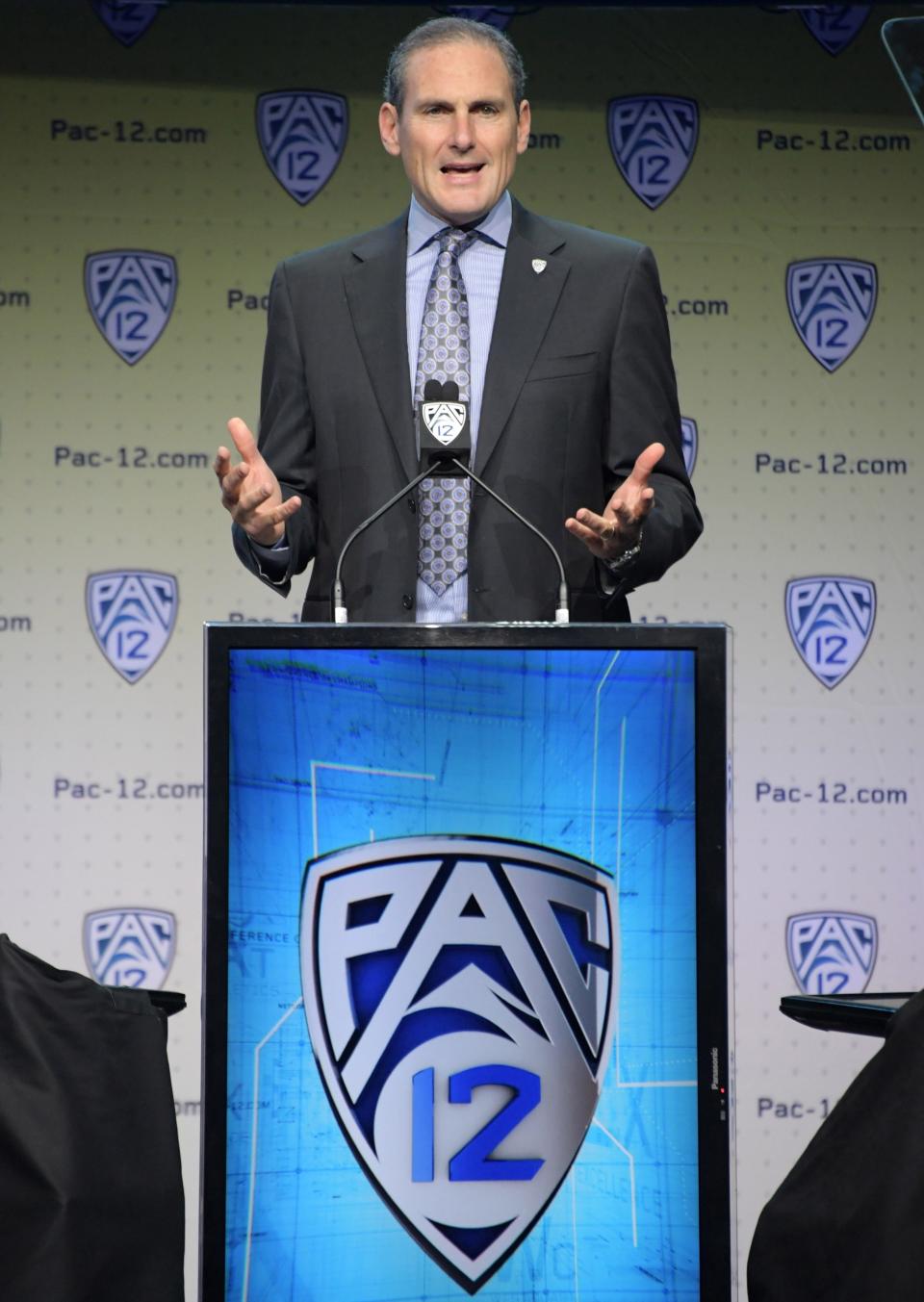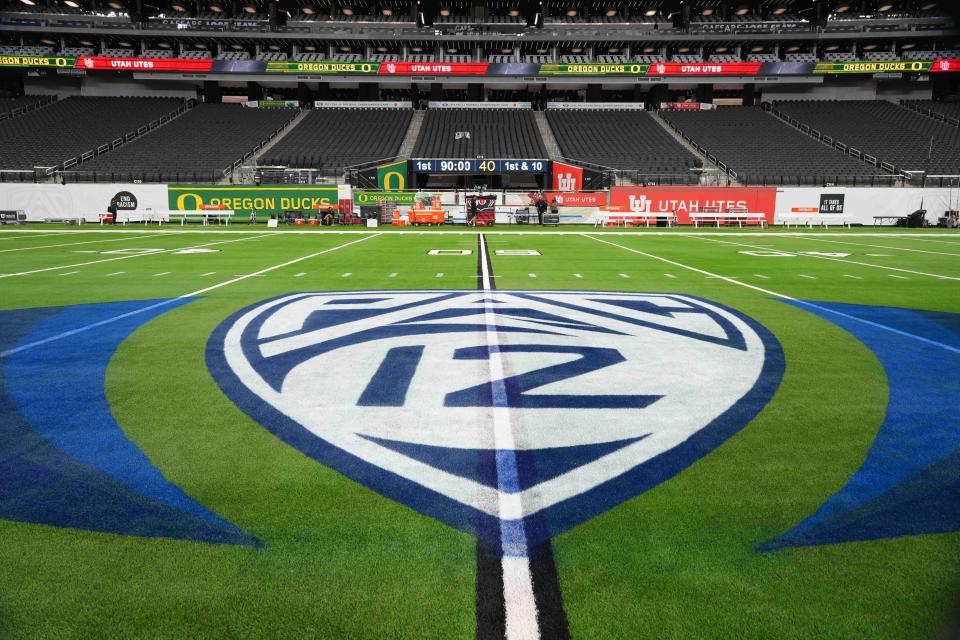'Please be discreet:’ Pac-12 records show more about commissioner’s exit in 2021
- Oops!Something went wrong.Please try again later.
Pac-12 Conference university officials carefully crafted their communications last year when they decided to part ways with Pac-12 commissioner Larry Scott, saying they "mutually" agreed with Scott to end their relationship more than a year before his contract expired in June 2022.
But emails obtained by USA TODAY Sports indicated Scott was "let go" after Pac-12 university presidents scheduled a meeting behind his back several weeks earlier. And while that’s not exactly shocking news, the records also provide a glimpse into how the public messaging of such a decision was managed behind the scenes at the top levers of power in college sports.
The records included talking points that were circulated among university officials about Scott, as well as briefs on individual reporters’ backgrounds before interviews with them about the decision announced Jan. 20, 2021. Another set of talking points distributed before the announcement included the words "mutual" or "mutually" seven times when referring to that decision.
SPORTS NEWSLETTER: Sign up now for daily updates sent to your inbox
COLLEGE FOOTBALL RE-RANK 1-131: Alabama tops after spring season; James Madison makes splash
And yet it didn’t always go according to script.
Shortly after the announcement, USA TODAY Sports made public records requests to various Pac-12 universities in an effort to learn more about the decision. It received some records in response to those requests last year but didn’t receive records from the University of Washington until May 12.

The records show that several weeks before that announcement, on Dec. 3, 2020, Oregon President Michael Schill sent an email to other Pac-12 university presidents and chancellors in an effort to schedule a meeting with them before the end of the month. He mentioned he was inviting a lawyer to the meeting.
"The purpose of this meeting is to continue the discussion we had in our earlier executive session about the commissioner," Schill wrote. "Larry will not be present and I am not letting him know we are scheduling this session since I don’t want to get him worried about things. So please be discreet."
Schill added that his executive assistant would be reaching out to find a good date.
"I will ask her to schedule 90 minutes although I anticipate we will need only 60," Schill wrote. "I will also invite Mike Sheetz to the meeting."
Sheetz is an attorney with the Cooley law firm who provides counsel to the Pac-12 governing board. It’s not clear what was discussed at the meeting scheduled for Dec. 18, 2020, but Schill sent another email to Pac-12 leaders Jan. 18, 2021, saying he wanted to schedule an executive session on a "time-sensitive matter" for Jan. 20.
The Pac-12 announced Scott’s departure that evening, saying the "conference and Scott decided it was time for new leadership after his 11-year tenure."
The Pac-12 university presidents and chancellors collectively govern the Pac-12 and the commissioner. Schill is the chair of the league executive committee, which includes Washington President Ana Mari Cauce and Washington State President Kirk Schulz.
The day after the announcement, Cauce received an invitation to participate in a separate event but noted what was happening in the Pac-12.
"I would normally jump at an opportunity like this – it’s an issue I care about deeply," Cauce wrote. "But, just yesterday we let go the commissioner of the Pac-12 and I’m on the president’s executive committee – which means I’ll be on the search committee. And you wouldn’t believe how much time this takes up because of interest from the press and public (I was talking to the press about this on Inauguration Day!!)."
A spokesman for Washington clarified Cauce’s comments in response to an inquiry from USA TODAY Sports.
"The Pac-12 leadership did indeed 'let go' of Commissioner Scott, which led to the search committee work that would be keeping President Cauce busy," said the spokesman, Victor Balta. "But that decision was a mutual and amicable one. The purpose of the note was for President Cauce to let them know she would be busy, not to parse the details of Scott’s employment status."
'Suggested talking points'

After the Pac-12 announced Scott's departure on Jan. 20, 2021, relations between Scott and the university presidents appeared to get a little awkward. The plan was for Scott to stay on the job through June of 2021 as the league searched for his successor.
But his lame-duck status immediately became an issue. A previously scheduled meeting of the Pac-12 executive committee was set for Jan. 22, 2021 – a Zoom call that normally would have included Scott. Schulz, the Washington State president, instead questioned whether Scott should attend. Schulz's assistant emailed Schill's assistant at Oregon the morning of Jan. 21, 2021.
"I mentioned to President Schulz that Larry would be on this call," Schulz's assistant wrote. "I believe he will try and speak with your President and President Cauce about this (maybe via text given how busy they are). But if it helps for me to relay – he has some concerns about Larry being on the call and if the leadership team will be as open as they might be if he is not on the call."
In another email, on Feb. 2, 2021, Schill accidentally let it slip to Scott that he had called for the meeting behind Scott’s back in December 2020. Schill sent an email to other university chief executives in the Pac-12 about whether to join together in support of certain public policy issues. Schill sent the message to Scott as well but apparently didn’t realize that the email thread included his prior emails to Pac-12 university leaders referencing the secret meeting about Scott.
If Scott had scrolled down into the email thread, he could have learned of those machinations, not that it would have made any difference then.
Schill realized this shortly after he sent it. About an hour later, he sent a follow-up email to the Pac-12 university presidents and chancellors but not Scott.
"I just realized that I didn't delete the material about scheduling the meeting about Larry from my email," Schill wrote. "I just replied to all. I apologize for my carelessness. Luckily, nothing in the leftover material was too problematic. Need to slow down."
Oregon spokeswoman Richie Hunter clarified to USA TODAY Sports that Schill didn’t permanently delete any record. Hunter said Schill just passed along prior emails by mistake instead of removing them from the new email conversation.
When asked for comment, Scott referred USA TODAY Sports to the Pac-12's news release of the announcement on Jan. 20, 2021. "I have nothing else to add," he said.
Scott had come under fire from fans and alumni in recent years for the league’s sagging revenues relative to other college sports conferences, along with the diminished stature of the league in football and the lack of reach for its Pac-12 Networks among cable and satellite providers. He was replaced last July 1 by George Kliavkoff, previously president of entertainment and sports for MGM Resorts International.
Pac-12 executive committee presidents scheduled interviews with reporters the day after the announcement and received talking points and briefs on those reporters beforehand from a vice president at Oregon under Schill.
The "suggested talking points" included the following:
►"Appreciate Larry’s pioneering efforts in growing the conference by adding new competitive university programs and accelerating the Pac-12 to debuting a television network alongside the other conferences."
►"Our television agreement was at one time the most lucrative in the nation."
►"Larry admirably guided his team and the conference through the pandemic."
Additional talking points were circulated to university leaders from Schill to prepare them for questions about Scott’s departure. He sent them the day of the announcement with anticipated questions and answers such as these:
"Q: Why is Larry Scott leaving? When will he leave? Was he fired? Did he resign?
"A: Larry’s contract ends on June 30 of next year (2022), but he has agreed to remain in his current role until June 30 of this year (2021) to assist with the transition. The decision not to renew his contract was a mutual decision among the university presidents, chancellors and Larry.
"Q: Who’s decision was this?
"A: This decision was made mutually by the conference’s university presidents, chancellors and Larry.
"Q: When did this take place?
"A: Our first discussions took place last week which was part of the normal timing for the start of these discussions. It became clear in our first conversation that the Conference was ready to move in a new direction, as was Larry. Given that, we both agreed there was no reason to wait until June of 2022, we felt the timing was right to begin the search for a new leader and Larry agreed to stay on until the end of this academic year in June (2021). …
"Q: Were there votes taken on relieving Larry Scott? Were they unanimous?
"A: The decision to mutually agree not to renew Larry’s contract was made by the university presidents and chancellors. The vote was unanimous. This also was Larry’s preferred plan."
Also among the records were emails or letters that pertained to who should replace Scott. One letter came from the CEO of Ball Corporation, an aluminum packaging company that had partnered with Colorado athletics to introduce recyclable cups at football games. He wrote to the Pac-12 executive committee, recommending CU athletics director Rick George as Scott’s replacement, with a "cc" to CU Chancellor Phil DiStefano.
"The challenges that the Pac-12 faces from an athletic perspective are well known," wrote the CEO, John Hayes, on Jan. 25, 2021. "There is no one better suited to lead this storied conference to athletic, academic and financial achievements that could be the envy of the higher education world than Rick George."
Scott earned $4.6 million in compensation from the Pac-12 in 2019 and $3.7 million in 2020, when revenues were down because of the pandemic, according to the most recently available tax records. Typically, when contract employees are fired, they are owed whatever pay they would have received if they had completed their full contract.
In the talking points memo circulated to Pac-12 university presidents and chancellors, this matter is addressed with a vague answer.
"Q: Will the Pac-12 pay out the rest of his contract?" the memo states.
"A: We will honor all of our contractual agreements."
Follow reporter Brent Schrotenboer @Schrotenboer. Email: bschrotenb@usatoday.com
This article originally appeared on USA TODAY: Pac-12 emails shed light on messaging around commissioner's 2021 exit

